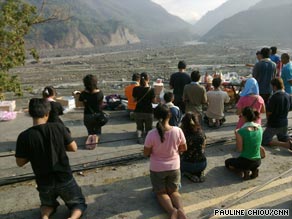- Ma says: I will take full responsibility. That contradicts ruled out resignation (see below). It is better rephrased as: I will take conditional responsibility.
- Ma says: "We will find out not only to correct the mistakes but (also) to punish the people responsible." This contradicts the title of the report that Taiwan's leader takes blame. If he is taking blames, what about those lucky fall guys he is planning to punish? Frankly, we should be frightened when he is looking everywhere except one place to correct mistakes when he is The Mistake! What he will find are not mistakes, but are scapegoats, or 余文, in Chinese.
CNN report follows:
Taiwan's leader takes blame for typhoon responseCISHAN, Taiwan (CNN) -- Taiwanese leader Ma Ying-jeou said Sunday he accepts responsibility for the government's slow response after Typhoon Morakot slammed into the island killing at more than 120 people and unleashing floods, mudslides and misery.

Mourners kneel and pray to the dead as they face the devastated valley of Shiao Lin.
Ma, who has faced heavy criticism from victims of the disaster, ruled out resignation, insisting his government did its best in the face of difficulties, however he pledged an investigation into any irregularities.
"Certainly, I will take full responsibility whatever the blame is because, after all, I am the president of this country," Ma told CNN, saying heavy rains grounded rescue helicopters in the first few days after the storm hit, delaying relief.
"Once the weather was good -- that is the 14th of August -- we were able to evacuate 2,518 people. It's a record," he said.
Hundreds of people still await rescue in remote areas of Taiwan, where torrential downpours, dense fog, rugged terrain and raging rivers have hampered relief efforts. Washed-out roads and collapsed bridges have made some rescue operations impossible
Touring disaster areas, Ma has been confronted by angry survivors, and even provoked a scuffle when he opened a weekend baseball game as protesters demanded he step down..
Ma has refused to quit, instead offering apologies and promises to do better.
"We will find out not only to correct the mistakes but (also) to punish the people responsible," he said.
Rescue efforts were ongoing Sunday with military helicopters bringing stranded villagers to their waiting relatives.
Watch rescue efforts in Taiwan »
Others, waiting days in anguish for word on their loved ones, lashed out in anger.
"Local officials don't care," one man said. "There are still people there and they don't do anything."
On Saturday, weeping relatives of typhoon victims set up shrines near devastated villages to calm the spirits of the dead and honor the belief that their souls will return home after seven days.
Watch mourners call home souls of the dead »
Morakot hit the island last weekend, dropping 2.6 meters (102 inches) of rain. Before it roared on to mainland China on Sunday, the storm killed at least 123 people in Taiwan.
The death toll could climb to more than 300 after more villagers buried by mudslides and floodwaters are found, Taiwan officials have said.
Southern and central Taiwan were hardest hit by the storm.
Mudslides inundated some places in the south, including the village of Shiao Lin, where 160 homes were lost. Authorities believe hundreds of people could be trapped under five stories of mud in the village.
International aid efforts were mobilizing on Sunday, however these were complicated by diplomatic pitfalls in the face of China's territorial claims over Taiwan, which it considers a renegade province awaiting reunification.
The U.S. military has begun a "modest" humanitarian aid mission to Taiwan with the despatch of a Marine Corps C-130 cargo plane carrying plastic tarpaulins for shelter, U.S. defense officials said.
Also Sunday, the USS Denver was en route to the Taiwanese coast with additional humanitarian aid and water purification capabilities, the officials said. The Navy ship is expected to arrive Monday, but officials could not say when it will launch its heavy-lift helicopters to drop the aid.
Sources in Washington have said in providing aid to Taiwan, the United States must be sensitive to its territorial relationship with China.
CNN's John Vause in Cishan, Taiwan; Pauline Chiou in Shiao Lin, Taiwan; and Mike Mount in Washington contributed to this report.
No comments:
Post a Comment